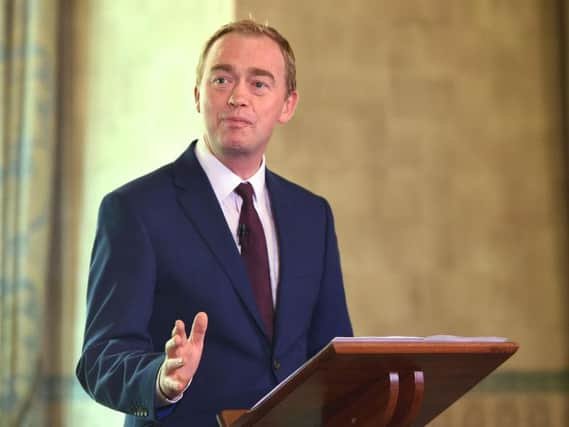Who are the contenders to replace Tim Farron as leader of the Lib Dems?


Would-be leaders have two weeks from the start of recess on July 20 to submit nominations from at least 10% of the parliamentary party - two MPs, not including themselves - as well as at least 200 members drawn from 20 or more local parties.
After a contest stretching over the summer, the new leader will be elected by party members in a postal ballot conducted by a single transferable vote in time for the start of the Lib Dem annual conference in Bournemouth on September 16. During the summer, the new Lib Dem deputy leader - due to be elected later this month - will lead the party politically while president Lady Brinton will oversee internal party affairs.
Advertisement
Hide AdAdvertisement
Hide AdHere are some of the possible contenders who could throw their hats into the ring:
:: Norman Lamb. The Liberal Democrat spokesman on health stood in the 2015 contest to replace Nick Clegg as leader, losing to Mr Farron by 43.5% to 56.5%.
Lamb, 59, has been MP for North Norfolk since 2001 and was a minister in the business and health departments during the Tory-Lib Dem coalition from 2012-15.
Seen as belonging to the centre-right wing of the party, Mr Lamb was a close ally of Mr Clegg, serving as his parliamentary aide when he was appointed deputy prime minister.
Advertisement
Hide AdAdvertisement
Hide AdLamb supported the early career of rapper Tinchy Stryder, whose management team includes his son Archie, remortgaging his home to help finance the grime star's early recordings.
:: Sir Ed Davey. Former energy and climate change minister Davey, 51, returned to Parliament at last week's election as MP for Kingston & Surbiton, having lost the seat as one of the victims of the Lib Dems' collapse at the 2015 election.
First elected to Parliament in 1997, he developed the policy of a penny on income tax for education as Treasury spokesman and went on to serve as chief of staff to Sir Menzies Campbell during his brief leadership of the party.
He served as a minister in the Department for Business during the coalition, before being promoted to the Cabinet as Energy Secretary following the resignation of Chris Huhne over a driving offence. He took a lead in Government in promoting measures to tackle the threat of climate change.
Advertisement
Hide AdAdvertisement
Hide Ad:: Jo Swinson. Installed as the bookies' favourite for the leadership just days after returning to Parliament as MP for Dunbartonshire East, Ms Swinson is the youngest of the possible contenders, at 37, as well as the only woman thought likely to stand.
She served as a junior minister in the Department for Business from 2012-15 during the coalition, following a brief stint as parliamentary private secretary to Mr Clegg.
She was the youngest member of the Commons when first elected to Dunbartonshire East in 2005, but lost her seat to the Scottish National Party's John Nicholson in 2015 before reversing the result in this month's snap election.
:: Sir Vince Cable. The former business secretary is the Liberal Democrats' elder statesman and has previously served as acting leader, following the resignation of Menzies Campbell in 2007, as well as serving as deputy leader from 2006-10. Formerly a Labour and SDP member, he was elected in 1997 as Lib Dem MP for Twickenham, a seat which he lost in 2015 and regained last week.
Advertisement
Hide AdAdvertisement
Hide AdCable was one of the few parliamentarians to warn of a looming financial crisis ahead of the 2008 crash and boosted his public profile with an appearance on Strictly Come Dancing.
As long ago as 2007, he said he was too old to stand for the leadership, and at 74, he would face questions over whether he is the right person to take the party through an election which may not come until 2022. His record, as business secretary, of presiding over increases in tuition fees and the privatisation of the Royal Mail may alienate some members.